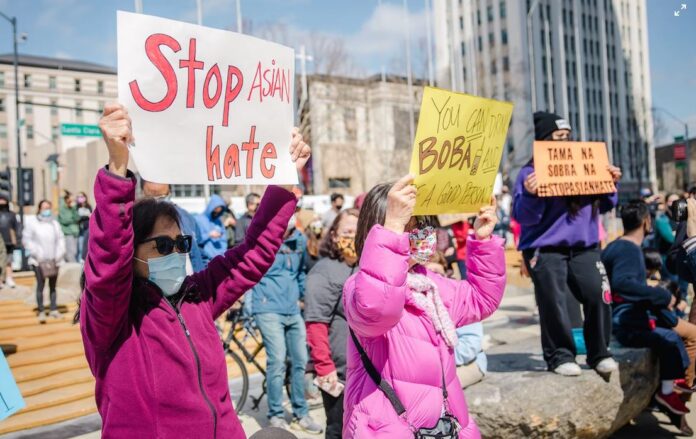By Randall Yip, AsAmNews Executive Editor
Ben Chan lives near Philadelphia and says he’s been the victim of microaggression, systematic racism and physical violence since the first grade.
The experience of the 41 year old is in line with a majority of more than 7,000 Asian Americans surveyed by the Pew Research Center for a study released today, November 30.
57% said they see discrimination against Asians in the U.S. as a major problem with 63% believing too little attention is paid to the issue.
Chan grew up in the Greenpoint neighborhood of Brooklyn in the 80s and recalls being only one of two Chinese kids in his first-grade class.
“I remember the first day of elementary school, that was the first time I was ever called “chink,” he said during a phone interview with AsAmNews. “The other thing that the other kids called me was ‘ching chong Wong.’ The other boys in my first-grade class kind of ganged up on me because I was different.”
Chan says the situation got so bad he came to blows with several students after both parents and teachers who witnessed the harassment did nothing to intervene.
He also remembers having to take an English as a Second Language class during lunchtime because the school automatically assumed he didn’t speak English well. It wasn’t until he spoke up that the school removed him from the ESL class. Chan was born and raised in New York.
“I wanted recess, so I spoke up. That’s when they realized that I didn’t belong in the ESL class. So that was like my first kind of taste of that kind of discrimination where they just look at you make assumptions and put you somewhere.”
78% of those polled said they’ve been treated as a foreigner even though they were born in the United States. Some have told them to go back to their “home country,” assumed they didn’t speak English well or criticized them for speaking a second language.
63% say others assume they are good at math or science and lack creative skills- stereotypes associated with the “model minority.”
37% have been called offensive names.
20% say security at airport checkpoints forced them to go through extra screening because of their race or ethnicity.
One in five Asian Americans says they’ve had experience with workplace discrimination. 15% believe they’ve been turned down from a job because of their race. 14% say they’ve been denied a promotion and 5% say they’ve been fired from a job due to racism.
“I think even leadership. I’ve been in workplaces where the workforce was, like, mostly Asian American, but the supervisor or the person in charge wasn’t and, you know, I always wondered is that because there’s some built-in bias about Asian Americans,” Chan said.
The survey sampled 1,777 Chinese, 1051 Filipinos, 1146 Koreans and 935 Vietnamese and 897 Asian Indians. 440 were from two or more Asian groups, nearly 300 were Japanese and 377 were classified as “other” or from smaller Asian subgroups. The margin of error in the sample was 2.1%,
2827 identified as Christian, 839 Buddhist and 559 Hindu.
(An earlier version of this article incorrectly identified the neighborhood where Chan grew up)
AsAmNews is published by the non-profit, Asian American Media Inc.
We are currently funded by our readers and such charitable foundations as the Robert Wood Johnson Foundation, AARP, Report for America/GroundTruth Project & Koo and Patricia Yuen of the Yuen Foundation.’
Find additional content on Bluesky, Facebook, Instagram , Tiktok, X, and YouTube. Please consider interning, joining our staff, or submitting a story, or making a tax-deductible donation.
You can make your tax-deductible donations here via credit card, debit card, Apple Pay, Google Pay, PayPal and Venmo. Stock donations and donations via DAFs are also welcomed. Contact us at info @ asamnews dot com for more info.


